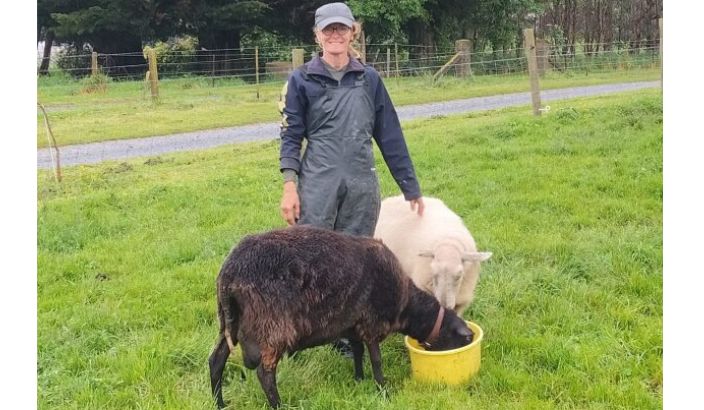A journey into sheep and goat milking

Julia Lee, of Golden Bay, who is passionate about the benefits of goat and sheep milk as well as sustainable agriculture. <em>Photo: Supplied.</em>
Julia Lee’s journey into sheep and goat milking began in 2007 when she noticed significant improvements in her son’s eczema after switching him to goat milk. This inspired Julia to learn how to milk and ignited her passion for sustainable farming.
“We were living in Kaikoura then and the difference the goat milk made to my son’s skin and gut health was huge,” Julia explains.
“We had several Saanan goats for milking and a Gotland ewe with good udders which intrigued me about the potential of sheep milk, so we tried it,” Julia says.
“Sheep’s milk is sweet and creamy and everyone who has tried it simply loves it.”
The closure of the Kaikoura Fonterra cheese factory saw Graham and Julia’s family relocate to North Canterbury. There, she continued milking goats and sheep for family consumption.
Interestingly, she says, sheep milk is highly nutritious as it is richer in vitamins A, B, and E, calcium, phosphorus, potassium, and magnesium than cow’s milk. It contains about one-third more energy than cow or goat milk.
Although a sheep only produces around 1 litre of milk per day, far less than a goat who will produce between 2-3 litres per day, the sheep milk curds to whey ratio is much higher than goat milk making it perfect for making cheese, using in coffees and hot chocolates.
“When I first started there seemed to be information on goat milking, but none on sheep milking so I started a Facebook page called ‘NZ milking sheep talk’ where people could share knowledge and ask questions,” Julia explains.
She says another challenge was accessing quality milking sheep. Determined to improve her stock, she worked hard tracking down suitable dairy bred rams to cross with a suitable ewe.
“Gotland sheep had good udders, but not the quantity so we ended up with a Awassi and East Friesian (Assaf) cross which made a healthy drought-resistant animal balanced for milk and meat,” she says.
In 2021, the family moved to a farm in Golden Bay, where people often asked a range of questions about sheep and goat milking. Inspired by this Julia began to host hands-on opportunities for those interested to learn about milking goats and sheep.
“It’s easy to learn and I want people to see that. Many people in the bay want to have their own milk, meat, and vegetables and to make the connection about where our food comes from,” Julia explains “From sheep you can get meat, milk, and wool, as well as an affectionate friendly animal.”
During these sessions people are also taught about handling sheep and goats. She often has Olly Rickets, a qualified vet technician, from a local business Homestead & Farm Services, discuss various farming and health care methods from mainstream to holistic.
Hosting groups has become a fulfilling experience for Julia, especially when children from the local kindergarten visit and engage in making the connection around where food comes from and how to respect and treat animals.
Julia says everyone who visits has some knowledge or something to share and that they all enjoy the therapeutic nature of farming, where people can connect with the land, animals, and each other. Julia believes in the importance of continuous learning and cherishes the community that has formed around her passion for sustainable agriculture.
